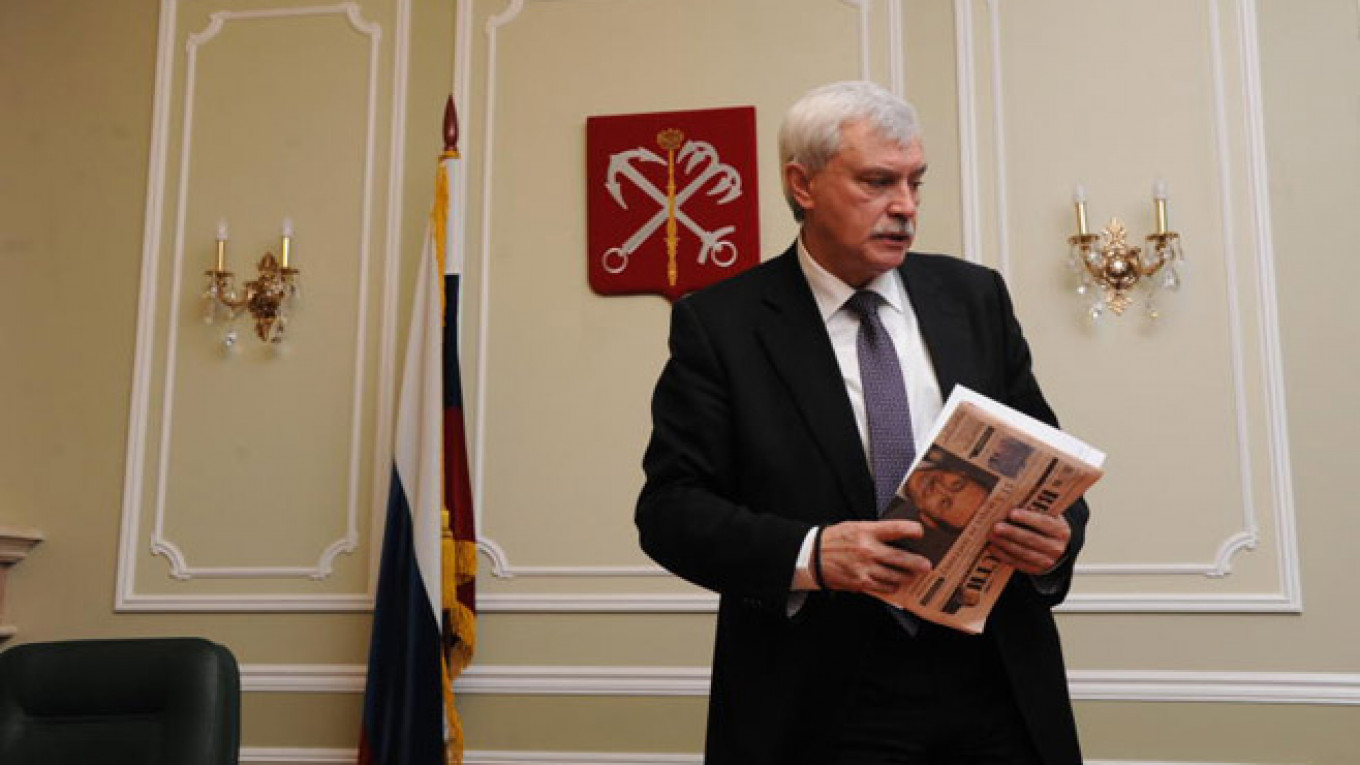President Vladimir Putin accepted the resignation of St. Petersburg Governor Georgy Poltavchenko on Wednesday, in a move that will bolster Poltavchenko's chance of winning an early re-election, and that may serve to strengthen the Kremlin's hold on regional politics.
Poltavchenko told Putin on Wednesday that his resignation was based on a desire to oversee the implementation of a multifaceted development program adopted by the city last month.
"I have the desire to personally participate in the development of this strategy and I would like, Vladimir Vladimirovich [Putin], to request your support to have early gubernatorial elections in St. Petersburg this September to realize what was planned and what, in my opinion, can realistically be done to further develop the city," Poltavchenko said, according to a transcript of the meeting published on the Kremlin's website Thursday.
Poltavchenko also told reporters in St. Petersburg that he was confident he would be re-elected in the first round, RBK reported Thursday.Poltavchenko's resignation comes amid a wave of recent gubernatorial dismissals that have paved the way to early elections. In total, the electorates of at least 32 regions will turn out to the polls on Sept. 14. Like many others in his position, Poltavchenko will continue to serve as acting governor in the months leading up to the elections.
This tactic favors the incumbent, leaving little time for competitors to prepare and execute their own electoral campaigns, and is an expression of the Kremlin's desire to assert greater authority over the regions, said Dmitry Oreshkin, the head of the Merkator research group, which monitors regional political developments in Russia
"It is not a coincidence that several governors are resigning in a short lapse of time," Oreshkin told The Moscow Times on Thursday. "This tactic accommodates both the Kremlin and regional governors themselves."
Oreshkin said that calling early elections may carry specific advantages for governors that were appointed and have never previously had to secure their positions by popular vote. Putin abolished elections at the gubernatorial level in 2004, but reintroduced the system in 2012 following a wave political protests.
"Governors are striking the iron while it is hot," Oreshkin said. "Governors are calling early elections because they know the situation will get worse with time. Prices will go up, and salaries and pensions will not follow. They will face problems that could jeopardize their reelection. And because Putin is popular right now, they want his popularity to rub off on them."
Likewise, Oreshkin said, the strategy helps ensure that governors will be able to deliver in helping the Kremlin secure the vote for its favored presidential candidate in 2018.
See also:
St. Petersburg Administration Lists 73 Urban Planning Mistakes
Contact the author at g.tetraultfarber@imedia.ru
A Message from The Moscow Times:
Dear readers,
We are facing unprecedented challenges. Russia's Prosecutor General's Office has designated The Moscow Times as an "undesirable" organization, criminalizing our work and putting our staff at risk of prosecution. This follows our earlier unjust labeling as a "foreign agent."
These actions are direct attempts to silence independent journalism in Russia. The authorities claim our work "discredits the decisions of the Russian leadership." We see things differently: we strive to provide accurate, unbiased reporting on Russia.
We, the journalists of The Moscow Times, refuse to be silenced. But to continue our work, we need your help.
Your support, no matter how small, makes a world of difference. If you can, please support us monthly starting from just $2. It's quick to set up, and every contribution makes a significant impact.
By supporting The Moscow Times, you're defending open, independent journalism in the face of repression. Thank you for standing with us.
Remind me later.






